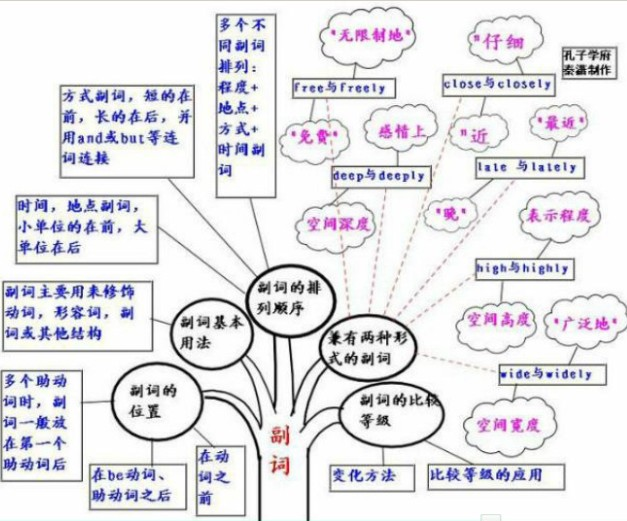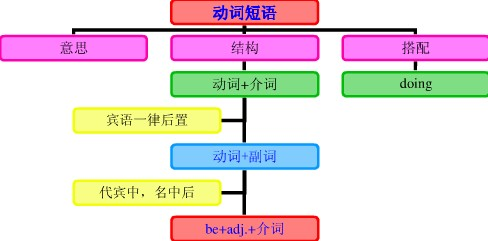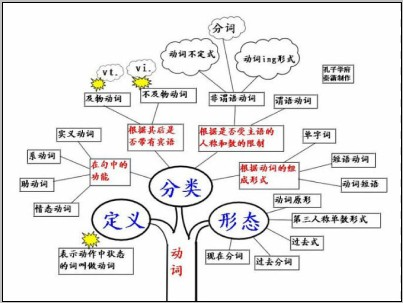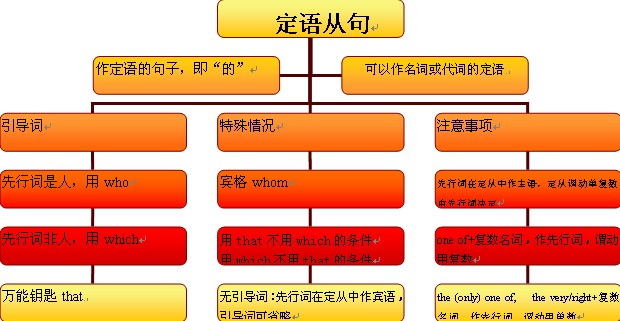本试题 “短文改错。 Sitting here in my room, I often think of my childhood. We used to live on a small farm. It was very far from the town that there were n...” 主要考查您对程度副词
副词
介词和介词短语
动词的过去式
系动词
动词短语
动词
过去分词
限制性定语从句
等考点的理解。关于这些考点您可以点击下面的选项卡查看详细档案。
- 程度副词
- 副词
- 介词和介词短语
- 动词的过去式
- 系动词
- 动词短语
- 动词
- 过去分词
- 限制性定语从句
程度副词的概念:
程度副词用来描述动作、行为或状态程度的副词称为程度副词。
absolutely完全地, almost几乎, amazingly令人惊异地, enormously非常地, enough充足地, entirely完全地, extremely极端地, fairly相当, fully完全地,
如:This task is extremely difficult. 这项任务极其艰难。
You're entirely wrong. 你完全错了。
英语中的“非常”程度副词系列:
1、very:
修饰原级形容词和副词以及完全形容词性化的现在分词或过去分词,如:tired, ashamed, exciting等。
注:1)非形容词性化的分词不能用very修饰,可用much修饰。
例:She is very pleased by his words.(×)
She is much pleased by his words.(√)
2)一些不分等级的形容词不能用very修饰,可用 quite(completely)修饰:
例:You are very wrong. (×)
You are quite wrong.(√)
3)部分以a开头的形容词不能用very修饰,可用much修饰。
例:She was very afraid of dogs. (×)
She was much afraid of dogs. (√)
2、much:
1)修饰动词:
2)修饰介词以及形容词和副词的比较级:
例:The girl is much like her mother. 这女孩非常像她妈妈。
She is much younger than her husband. 她比她丈夫年轻多了。
3)修饰部分以a开头的形容词,如:afraid, awake, alive, ashamed, alone, etc。
3、well:
作“很,非常,相当”讲,主要用来修饰动词、介词短语或用于固定搭配。
例:She was well past thirty at that time. 她那时刚好过了30岁。
His house is over there, well above the other houses. 他的房子在那边,就在其他房子的上方。
I don't know him well. 我不是特别了解他。
The book is well worth reading. 这本书非常值得读。
4、quite:
1)修饰表示绝对意义的形容词或副词,如:sure, certain, possible, impossible, right, wrong, perfect, dead, ready等。
例:I'm quite sure the dog is quite dead. 我非常确信狗确实是死了。
2)修饰动词或名词。
例:She quite likes the bike, but she is not quite ready to buy it. 她非常喜欢自行车,但是她不是特别想买它。
I had quite a time at your party that evening. 那晚我在你的聚会上呆了相当长的时间。
3)可修饰good, well, old, young等个别形容词的比较级。
例:She's feeling quite better today. 她今天感觉好多了。
She looks quite older than before. 她看上去比以前老多了。
5、badly:
表示程度时含有迫切之意,常修饰want, need等动词或表示不良情况的短语。
例:They are badly in need of teachers. 他们急需老师。
She wants to go abroad badly. 她非常想出国。
He was badly wounded. 他受伤很重。
6、enough:
意为“足够地、非常、很”,修饰形容词,副词,动词,但须放在这些词的后面。
例:The meat is not done enough. 肉不是十分熟。
The boy ran fast enough to catch up with the dog. 那男孩跑得非常快,能够跟上那只狗。
7、fast/sound/wide/widely:
这些词用作程度副词,主要用在一些固定搭配中。
例:The baby was fast(sound) asleep. 那孩子很快就睡着了/睡得很香。
She was wide awake at that time. 她在那时非常清醒。
These books are widely different. 这些书非常与众不同。
Opinions vary widely on this subject. 就这一主题各方观点差异很大。
8、nice(good, fine)and+形容词(副词):
例:He was good and tired afterw ork. 他工作后非常累。
The flowers look good and beautiful. 花非常漂亮。
程度副词的特点:
程度副词有于表示程度,常见的如:fairly, pretty, rather, quite, very, much, too, greatly, almost, nearly, half, highly, awfully, deeply, partly, perfectly, really等。使用时注意以下几点:
(1)程度副词主要用于修饰形容词和副词,有的还可修饰比较级(如much, rather等)和最高级(如quite, much, almost等):
如:Houses are much more expensive these days. 如今的房价贵多了。
This is quite[much] the most expensive radio here. 这是这里最贵的收音机。
注:quite有时也修饰比较级,但只用于quite better(身体康复)这一表达。
(2)有的程度副词(如:quite, rather, almost等)可修饰动词,但有的(如:fairly, pretty, very等)则不能修饰动词:
如:I quite agree with you. 我完全同意你的意见。(不用fairly, pretty, very)
如:We rather like the film. 我们很喜欢这部电影。(不用fairly, pretty, very)
注:much也可修饰动词,但这通常只限于否定句或疑问句,而不用于肯定陈述句,除非其前有very,too,so等之类的修饰语:
如:She doesn't like him much. 她不太喜欢他。
Does she much like him?/ Does she like him much? 她很喜欢他吗?
He likes the film very much. 他很喜欢这部电影。(不能说:He likes the film much.)没有very, too, so等修饰的much有时也可能在肯定句修饰动词,但这只限于regret, admire, prefer, appreciate等少数动词,且此时的much应置于句中,而不是句末:
如:We much appreciate your invitation. 我们非常感激你的邀请。
(3)个别的程度副词(主要是quite和rather)还可修饰名词(注意词序):
如:It's quite[rather] a good idea./ It's a quite[rather] good idea. 那可真是个好主意。
若此结构中没有形容词,则quite和rather则只能放在冠词之前:
如:It was quite[rather]a success. 那事相当成功。
程度副词的用法注意点:
(1)exactly程度副词主要用于修饰形容词和副词,有的还可修饰比较级(如much,rather等)和最高级(如quite, much, almost等)。
如:This is quite[much] the most expensive radio here. 这是这里最贵的收音机。
【说明】quite有时也修饰比较级,但只用于quite better(身体康复)这一表达。
(2)有的程度副词(如quite, rather, almost等)可修饰动词,但有的如fairly, pretty, very等,则不能修饰动词。
如:I quite agree with you. 我完全同意你的意见。(不用fairly, pretty, very)
如:We rather like the film. 我们很喜欢这部电影。(不用fairly, pretty, very)
(3)个别的程度副词(主要是quite和rather)还可修饰名词(注意词序)。
如:It's quite[rather] a good idea./ It's a quite[rather] good idea. 那可真是个好主意。
若此结构中没有形容词,则quite和rather则只能放在冠词之前。
如:It was quite[rather] a success. 那事相当成功。
副词的概念:
副词是指在句子中表示行为或状态特征的词,用来修饰动词、形容词、其他副词、介词短语、非谓语动词乃至整个句子,表示时间、地点、程度、方式等概念。
副词的位置:
1)在动词之前。
2)在be动词、助动词之后。
3)多个助动词时,副词一般放在第一个助动词后。
注意:
a. 大多数方式副词位于句尾,但宾语过长,副词可以提前,以使句子平衡。
如:We could see very clearly a strange light ahead of us.
b. 方式副词well,badly糟、坏,hard等只放在句尾。
如:He speaks English well.
副词的排列顺序:
1)时间,地点副词,小单位的在前,大单位在后。
2)方式副词,短的在前,长的在后,并用and或but等连词连接。
如:Please write slowly and carefully.
3)多个不同副词排列:程度+地点+方式+时间副词。
注意:副词very可以修饰形容词,但不能修饰动词。
改错:(错)I very like English.
(对)I like English very much.
注意:副词enough要放在形容词的后面,形容词enough放在名词前后都可。
如:I don't know him well enough.
There is enough food for everyone to eat.
There is food enough for everyone to eat.
兼有两种形式的副词:
1)close与closely:
close意思是“近”;closely意思是“仔细地”。
如: He is sitting close to me.
Watch him closely.
2)late与lately:
late意思是"晚";lately意思是“最近” 。
如:You have come too late.
What have you been doing lately?
3)deep与deeply:
deep意思是“深”,表示空间深度;deeply时常表示感情上的深度,“深深地” 。
如:He pushed the stick deep into the mud.
Even father was deeply moved by the film.
4)high与highly:
high表示空间高度;highly表示程度,相当于much。
如:The plane was flying high.
I think highly of your opinion.
5)wide与widely:
wide表示空间宽度;widely意思是“广泛地”,“在许多地方”。
如:He opened the door wide.
English is widely used in the world.
6)free与freely:
free的意思是“免费”;freely的意思是“无限制地”。
如:You can eat free in my restaurant whenever you like.
You may speak freely, say what you like.
副词知识体系:

介词和介词短语的概念:
介词是一种用来表示词与词、词与句之间的关系的虚词,在句中不能单独作句子成分。介词后面一般有名词、代词或相当于名词的其他词类,短语或从句作它的宾语。介词和它的宾语构成介词词组,在句中作状语,表语,补语或介词宾语。介词可以分为时间介词、地点介词、方式介词和其他介词。
误用介词的三种情况:
1、多用介词:
多用介词可能是受汉语意思的影响将及物动词误用作不及物动词,也可能是受相关结构的影响而用错:
误:We discussed about the plan.
正:We discussed the plan. 我们讨论了计划。
误:Did he mention about the accident?
正:Did he mention the accident? 他提到那次事故了吗?
误:I saw her enter into the bank.
正:I saw her enter the bank. 我看见她进了银行。
误:He married with[to] a nurse.
正:He married a nurse. 他同一位护士结了婚。
误:How can contact with you?
正:How can contact you? 我怎么与你联系?
误:We should serve for the people heart and soul.
正:We should serve the people heart and soul. 我们应该全心全意地为人民服务。
误:Who controls over the factory? (但名词control可接over)
正:Who controls the factory? 谁管理这个工厂?
误:He has a great many of friends here. (比较a great number of)
正:He has a great many friends here. 他在这儿有很多朋友。
2、漏用介词:
漏用介词可能是受汉语意思的影响将不及物动词误用作及物动词,或是受相关结构的影响的影响而用错等:
误:This matter is difficult to deal. (deal with=处理)
正:This matter is difficult to deal with. 这事很难处理。
误:He is not a man to be depended.
正:He is not a man to be depended on. 他不是个可靠的人。
误:He took a cup of tea, and went on the story.
正:He took a cup of tea, and wentonwiththestory.他喝了一口茶,又接着讲故事。
误:My mother still regards me a child. (比较consider…as中的as可省略)
正:My mother still regards me as a child. 我母亲还把我当小孩看。
误:They insisted sending a car over to fetch us.
正:They insisted on sending a car over to fetch us.他们坚持要派车来接我们。
误:What he says is worth listening.
正:What he said is worth listening to.他的话值得一听。
3、错用介词:
错用介词的情况比较复杂,可能是因受汉语意思的而错,也可能是因弄不清搭配关系而错,可能是混淆用法而错,也可能是受相关结构的影响而错,可能是忽略语境而错,也可能是想当然的用错:
误:She called on his office yesterday. (call on+人,call at+地点)
正:She called at his office yesterday. 她昨天去了他办公室拜访。
误:He is engaged with a nurse.
正:He is engaged to a nurse.他与一位护士订了婚。
误:The sun rises from the east.
正:The sun rises in the east.太阳从东方升起。
误:Under his help, I finished it in time.
正:With his help, I finished it in time. 在他的帮助下,我及时做完了。
误:During he was in Japan, he visited many places.
正:During his stay in Japan, he visited many places.他在日本期间,参观过许多地方。
误:We are familiar to his character.
正:We are familiar with his character.我们了解他的性格。
误:Help yourself with the fruit.
正:Help yourself to the fruit.吃点水果吧。
介词的宾语:
1、名词或代词作介词宾语:
如:Are you interested in history? 你对历史感兴趣吗?
Don't worry about it. 别为它担心。
注:若是人称代词用作介词宾语,要注意用宾格。
如:No one can sing like her. 没有人能像她那样唱歌。(不能用like she)
2、动名词作介词宾语:
如:He is good at telling stories. 他善于讲故事。
In crossing the street he was run over. 他在穿过马路时被汽车撞倒。
3、过去分词作介词宾语:
如:We can't regard the matter as settled. 我们不能认为这事已经解决。
I take it for granted you have read the book. 我以为你读过这本书。
注:过去分词用作介词宾语通常只见于某些固定结构中,如上面第1句涉及regard…as(认为…是)结构,第2句涉及take sth for granted(认为某事属实)。在其他情况下,介词后通常不直接跟过去分词作宾语,若语义上需要接过去分词(表被动),可换用“being+过去分词”:
如:He went out without being seen by the others.他出去了,没有被其他人看见。
4、从句作介词宾语:
如:He was not satisfied with what she said. 他对她说的不满意。
I'm worried about where he is. 我担心他上哪儿去了。
注:介词后通常不接that从句,遇此情况需考虑用其他结构:
误:He paid no attention to that she was poor.
正:He paid no attention to the fact that she was poor. 他根本不注意她很穷这一事实。
但有个别介词(如except)可接that从句。
比较:I know nothing about him except that he lives next door./I know nothing about him except for the fact that he lives next door. 我只知道他住在隔壁,其它的就不知道了。
5、不定式作介词宾语:
如:I had no choice but to wait. 除了等,我没有别的选择。
He wanted nothing but to stay there. 他只想留在那儿。
They did nothing but complain. 他们老是一个劲地抱怨。
He never did anything but watch TV. 除了看电视,他从不干任何事。
注:(1)介词后接不定式的情形通常只见于but, except等极个别个词。该不定式有时带to,有时不带to,其区别是:若其前出现了动词do,其后的不定式通常不带to;
若其前没有出现动词do,则其后的不定式通常带to。
(2)介词后虽然通常不直接跟不定式作宾语,但却可接“连接代词(副词)+不定式”结构:
如:He gave me some advice on how to do it. 对于如何做这事他给我提了些建议。
6、形容词作介词宾语:
如:Her pronunciation is far from perfect. 她的语音远不是完美的。
In short, we must be prepared. 总而言之,我们要有准备。
Things have gone from bad to worse. 事情越来越糟。
注:(1)有些形容词用作介词宾语可视为其前省略了动名词being:
如:He regarded the situationas(being) serious. 他认为形势严重。
His work is far from(being) satisfactory. 他的工作丝毫不令人满意。
(2)有些“介词+形容词”的结构已构成固定搭配:in full全部地,全面地,无省略地; in private私下地,秘密地; in particular特别地;in general一般地,通常地,概括地; in brief 简言之;in short总之,简言之; in vain徒然地,徒劳无益地;for fee免费地,无偿地; for certain肯定地,确切地;for sure肯定地,确切地; for short为了简短,简称;atl arge自由自在地,逍遥法外; by far…得多
7、副词作介词宾语:
如:I can't stay for long. 我不能久呆。
It's too hot in here. 这里面太热了。
I looked every where except there. 除了那儿,我到处都看过了。
8、数词作介词宾语:
如:The city has a population of four million. 这座城市有四百万人口。
He was among the first to arrive. 他是第一批到的。
9、介词短语作介词宾语:
如:Choose a book from among these. 从这些书中选一本吧。
I saw her from across the street. 我从街的对面望见了她。
注:通常可后接介词短语作宾语的介词是from, till, until, since, except, instead of等。
比较:I took it from the bed. 我从床那儿(或床上)拿的。
I took it from under the bed. 我从床下拿的。
10、复合结构用作介词宾语:
如:She had no objection to Mary marrying him. 她不反对玛丽与他结婚。
She came in with a book in her hand. 她手里拿着一本书走了进来。
All the afternoon he worked with the door locked. 整个下午他都锁着门在房里工作。
介词短语的句法功能:
1、表语:
如:He was with a friend. 他和一个朋友在一起。
Health is above wealth. 健康胜过财富。
This knife is for cutting bread. 这把小刀是用于切面包的。
注:有些介词(如because of)引出的短语通常只用作状语,不用作表语:
误:His absence is because of the rain.
正:His absence is due to the rain. 他因雨未来。
但是,若主语是代词(不是名词),becauseof引出的短语可用作表语:
如:It is because of hard work. 那是因为辛苦工作的原因。
2、状语:
如:Don't touch it with your hands. 别用手去摸它。
Did you do this by design or by accident? 你这样做是有意的还是无意的?
3、定语:
如:This is his reply to your letter. 这是他给你的回信。
This is the best way of doing it. 这是做此事最好的方法。
My love for you is deeper than the sea. 我对你的爱比海深。
4、宾语补足语:
如:I found everythingin good condition. 我发现一切正常。
Her illness kept her in bed for a week. 她因生病在床上躺了一星期。
注:用作宾语补足语的介词短语在相应的被动语态中则为主语补足语:
如:He was regarded as a hero. 他被看成是英雄。
5、宾语:
如:A man stepped out from behind the wall. 一个人从墙后走出来。
He cannot spare anytime except on Sunday. 除星期日外,他抽不出时间。
6、主语:
如:Between6 and 7 suits me. 六点到七点对我比较适合。
After the exams is the time to relax. 考试后是轻松一下的时间。
注:介词短语通常不用作主语,尽管有时也像上面这样用作主语,但通常可视为是在一定的上下文中有所省略:
如:—When are we going to have the next meeting? 我们下次什么时候见面?
—On Tuesday may be convenient. 星期二可能比较方便。
此句中onTuesday虽用作主语,但可视为是其前省略了meeting一词:
即:Meeting during the vacation may be convenient.
动词过去式的概念:
用来表示动词过去时的动词形式,规则变化加是动词后加-ed,不规则的要单独记。
动词过去式变化规则及其读音规则:
一、规则动词的过去式变化如下:
1、一般情况下,动词词尾加-ed:
如:work-worked play-played wanted-wanted act-acted
2、以不发音的-e结尾动词,动词词尾加-d:
如:live-lived move-moved taste-tasted hope-hoped
3、以辅音字母+y结尾的动词,把-y变为-i再加-ed:
如:study-studied copy-copied cry-cried carry-carried
4、以一个辅音字母结尾的重读闭音节动词,双写词尾辅音字母,再加-ed:
如:stop-stopped
5、不规则动词的过去式变化规律性不强,须多加记忆。
如:go-went make-made get-got buy-bought come-came fly-flew
二、不规则动词的过去式的构成:
1、把动词原形中的i改为a,变成过去式。
如:begin—began,drink—drank,give—gave,ring—rang,sing—sang,sit—sat,swim—swam
2、把重读开音节中的i改为o,变成过去式。
如:drive—drove,ride—rode,write—wrote
3、改动词原形中的aw/ow为ew,变成过去式。
如:draw—drew,grow—grew,know—knew,throw—threw(动词show除外,show—showed)
4、动词原形中的e改为o,变成过去式。
如:get—got,forget—forgot
5、动词原形中的ee改为e,变成过去式。
如:feed—fed,meet—met
6、动词原形中的eep改为ept,变成过去式。
如keep—kept,sleep—slept,sweep—swept
7、动词原形中的eak改为oke,变成过去式。
如:break—broke,speak—spoke
8、动词原形中的ell改为old,变成过去式。
如:sell—sold,tell—told
9、动词原形中的an改为oo,变成过去式。
如:stand—stood,understand—understood
10、以ought和aught结尾,且读音是〔:t〕的过去式。
如:bring—brought,buy—bought,think—thought,catch—caught,teach—taught
11、以ould结尾且读音为〔ud〕的情态动词过去式。
如:can—could,shall—should,will—would
12、把动词原形中的o改为a,变成过去式。
如:come—came,become—became
13、在动词原形后加d或t变成过去式,并且发生音变。
如:hear〔hi〕—heard〔h:d〕,say〔sei〕—said〔sed〕,mean〔mi:n〕—meant〔ment〕
14、动词的过去式与动词原形一样。
如: let—let,must—must,put—put,read—read〔red〕
15、不符合上述规律的动词过去式。
如:am,is—was,are—were,build—built,do—did,eat—ate,fall—fell,feel—felt,find—found,fly—flew,
go—went,have/has—had,hold—held,leave—left,make—made,may—might,run—ran,see—saw,take—took
三:过去式“-ed”的发音规则:
(1)动词词尾为“t,d”时,发/id/音。
如:want→wanted(要)need→needed(需要)
(2)动词词尾为清辅音时,发/t/音。
如:help→helped(帮助)laugh→laughed(笑)look→looked(看) kiss→kissed(吻)wash→washed(洗)watch→watched(注视)
(3)动词词尾为t,d以外之浊辅音或元音时,发/d/音。
如:call→called(叫)stay→stayed(停留)cry→cried(哭)
be动词的过去式:
在没有实义动词的句子中使用be动词,am,is的过去式为was;are的过去式为were.请看如下句型的构成:
1、肯定句:主语+was(were)+宾语
例:I was late yesterday.(昨天我迟到了。)
2、否定句:主语+was(were)+not+宾语
例:We weren't late yesterday. (我们昨天没迟到)
3、疑问句:Was(Were)+主语+宾语
例:Were you ill yesterday?(你昨天病了吗?)
4、肯定回答:Yes, I was. (是的,我病了。)
否定回答:No, I wasn't. (不,我没病。)
5、特殊疑问句:特殊疑问词+was(were)+主语+宾语
例:When were you born? 你是什么时候出生的?
【方法窍门】
be的过去式有四巧:
一是时间状语巧:表示过去的短语要记牢;
二是形式巧:单数was,复数were;
三是否定句结构巧:not紧跟was/were;
四是疑问句式巧:was/were向前跑(提前)。
【思路分析】
『一巧』 时间状语巧。一般过去时表示过去发生的动作或存在的状态,恰巧与表示过去的一些时间状语连用。
例如:yesterday, last night/week/month/year, last Saturday, the day beforey esterday, in 1998, five years ago等。
『二巧』 形式巧。它与一般现在时一样,形式多样:当主语是第一人称单数或第三人称单数时,谓语动词用was;主语是第二人称或其他人称复数时,谓语动词用were。
例如:I was in the classroom yesterday morning. 昨天早上我在教室里。
He was at school last Tuesday. 上周二他在学校。
They were over there a moment ago. 刚才他们在那边。
『三巧』 否定句结构巧。与动词be的一般现在时一样,它在动词后面加not即可变成否定句,并且was, were与not可以缩写成wasn't, weren't。即:主语+wasn’t/weren’t+表语+其他。
例如:I was not(=wasn't)here yesterday. 昨天我不在这儿。
My parents were not(=weren't)at home last Sunday. 上周日我父母不在家。
『四巧』 疑问句式巧。把was, were提到句首,句末用问号即可变为一般疑问句。即:Was(Were)+主语+表语+其他?这恰巧与动词be的一般现在时的疑问句式相似。
例如:Were you at home the day before yesterday? 前天你在家吗?
Was she late this morning? 今天早上她迟到了吗?
更巧的是疑问句的答语也相似,肯定回答用“Yes, 主语+was/were.”;否定回答用“No, 主语+wasn't/weren't.”。
例如:—Were Wei Hua and Han Mei here just now? —刚才魏华和韩梅在这儿吗?
—Yes, they were./No, they weren't.是的,在这了。
系动词的概念:
连系动词(link verb)是一个表示谓语关系的动词。它必须后接表语(通常为名词或形容词)。连系动词的功能主要是把表语(名词、形容词、某些副词、非谓词、介词短语、从句)和它的主语联系在一起,说明主语的属性、特征或状态。它有自己的但不完全的词义,不能在句中独立作谓语,必须和后面的表语一起构成句子的谓语。它是虚词。
系动词的分类:
1、状态系动词:
用来表示主语状态,只有be一词。
例如:He is a teacher. 他是一名教师。(is与补足语一起说明主语的身份。)
2、持续系动词用来表示主语继续或保持一种状况或态度,主要有keep, rest, remain, stay, lie, stand:
例如:The weather will continue cold and wet.
He remained poor after 20years.
The shop will stay open at 11:00p.m.
He stood/sat silent there.
3、表像系动词:
用来表示"看起来像"这一概念,主要有seem, appear, look。
例如:She appears to have know this thing.
She seems a student.
4、感官系动词:
感官系动词主要有feel, smell, sound, taste。
例如:The silk feels soft.
Your idea sounds a good one.
He looked like his mother.
The mixture tasted terrible.
The flower smells sweet.
5、变化系动词:
这些系动词表示主语变成什么样,变化系动词主要有become, grow, turn, fall, get, go, come, run。
例如:My dream o fcoming to China has come true.
In summer food often goes bad.
He turned doctor./ He became a doctor.
He fell asleep as soon as he went to bed.
6、终止系动词表示主语已终止动作,主要有prove, turn out,表达"证实","变成"之意。
例如:The truth he stuck to proved true.
系动词基本用法:
连系动词是表示不完全谓语关系的动词,它与其后的表语一起构成谓语。
常见的连系动词有be(是),become(成为),get(变成),remain(还是),seem(似乎是),look(看上去),feel(感觉)等。
连系动词后的表语通常是名词和形容词,有时也可以是代词、数词、副词、介词短语、不定式、动名词、从句等:
如:His English is excellent. 他的英语很棒。(跟形容词)
He is a famous poet. 他是著名诗人。(跟名词)
Money isn't everything. 金钱不是一切。(跟代词)
She was the first to arrive. 她是第一个到达的人。(跟数词)
Who is up stairs? 谁在楼上?(跟副词)
He is with his friends. 他和朋友在一起。(跟介词短语)
He seems to be ill.他似乎病了。(跟不定式)
Seeing is believing. 眼见为实。(跟动名词)
This is what you need. 这就是你需要的。(跟从句)
注:有些系动词又是实义动词,该动词表达实义时,有词义,可单独作谓语。
例如:1、She tasted①the soup to see if it tasted②too salty. 她尝了一口汤,看是否太咸。
2、The doctor is feeling①his pulse because he feels②sick. 因为身体不舒服,医生正在给他切脉。
3、The mother looked①at the sick child sadly and she looked②sad. 母亲难过地看着生病的孩子。
4、She smelled①the meat to make sure it still smelled②good. 她闻了闻肉,看看是否还新鲜。
5、The teacher asked the students to keep②quite when they were keeping①everything in order. 当学生整理东西时,老师让他们保持安静。
从以例子不难出,标①的动词为实义动词,他们后跟有宾语;标②的动词为系动词,其后往往跟形容词、名词、不定式等作表语。
系动词知识体系:

连系动词使用应注意的两点:
1、关于连系动词后接副词作表语:
连系动词后通常可接形容词作表语,一般不接副词:
误:His English is very well. 他的英语很好。(应将well改为good)
误:Be carefully. 小心点。(应将carefully改为careful)
误:The soup tastes nicely. 这汤味道不错。(应将nicely改为nice)
但是,有时连系动词后也可接副词作表语,不过这主要限于in, on, off, out, away, behind, up, down, over, through, around, round, below, inside, outside等少数副词小品词以及here, there, upstairs, downstairs等少数表示地点或方位的副词:
如:Mother wasn't in last night. 母亲昨晚不在家。
The meeting was over at five. 会议五点结束。
Come along. The taxi is outside. 来吧,出租车在外面。
Mother is downstairs waiting for you. 母亲在楼下等你。
2、关于连系动词后接不定式:
(1)连系动词be后根据情况可自由地接不定式作表语:
如:My dream is to be a scientist. 我的梦想是当一名科学家。
All I could do was to wait. 我只能等。
My plan was to go from London to Paris. 我计划从伦敦去巴黎。
I was to have seen Mr Kay. 我本要去见凯先生的。
(2)seem, appear, prove, continue, turn out, get, grow, come等连系动词后也可接不定式(尤其是to be)作表语:
如:She always seems to be sad. 她常常显得很忧伤。
My advice proved to be wrong. 我的意见证明是错的。
She appears to have many friends. 他好像有很多朋友。
The weather turned out to be fine. 天气结果很好。
Circumstances continue to be favorable. 情况仍然是有利的。
He has grown to like studying English. 他渐渐喜欢学英语了。
【注】
若所接不定式为to be,通常可以省略。不过,若其后接的是表语形容词,则to be通常不宜省略。
另外,连系动词look后能否接tobe似乎尚有争论,不过,在现代英语中接to be的现象已较普遍。
(3)sound, smell, feel, taste, become等连系动词后通常不能接不定式:
误:These oranges taste to be good. (应去掉to be)
误:The roses smell to be nice.(应去掉to be)
(4)有的连系动词后接的从句可用不定式来改写:
如:It seems that she's right./ She seems to be right. 她似乎是对的。
It appears that you have made a mistake./You appear to have made a mistake. 似乎你弄错了。
动词短语的概念:
动词常和某些其他词类用在一起,构成固定词组,形成所谓短语动词(phrasalverb)。和动词一样,短语动词也可分为及物和不及物两种。短语动词可以作为一个整体看待,同一般动词一样使用。
动词短语的搭配类型:
1)动词+介词:这类短语动词用作及物动词,后面须跟宾语。
如:The small boy insisted on going with his parents. 那男孩坚持要跟父母一起去。
Do you often listen to broadcasts in English? 你常听英语广播吗?
Look at the children. Aren't they lovely? 看着这些孩子们。他们多么可爱呀!
We stand for self-reliance. 我们是主张自力更生的。
这一类的短语动词还有很多,如depend on(upon)(依靠),wait on(服侍),look for(寻找),deal with(对待),look after(照料),wait for(等待)等。
2)动词+副词:
这类短语动词有的用作及物动词,有的用作不及物动词。
如:I always get up as soon as the bell rings. 我总是一打铃就起床。(不及物)
Look out, there's a car coming! 当心,来汽车了!(不及物)
Have you handed in your exercises already? 你已经交练习了吗?(及物)
Please don't forget to put on your coat, it's cold outside. 请不要忘记穿外衣,外面很冷。(及物)
这一类的短语动词还有很多,及物如put out(扑灭),eat up(吃光),put down(放下);不及物如set off(出发),come up(走近),go on(继续)。
注:"动词+副词"这类短语动词和上面第一类"动词+介词"的不同之处在于:"动词+介词"用作及物动词,后面须跟宾语。"动词+副词"则有的及物,有的不及物;用作及物动词而宾语为人称代词或自身代词时,副词往往放在宾语之后。
如:Please wake me up at five tomorrow. 请在明天早上五点唤醒我。
If you have done your exercises, please hand them in. 如果你们练习做完了请交来。
She doesn't normally behave like that, she's putting it on. 她通常并不如此表现,她是装出来的。
注:这类短语动词有不少可兼作及物和不及物动词用。
如:He took off his hat when he entered the office. 他进办公室后脱下帽子。(及物)
The plane took off at seven sharp. 飞机在七点整起飞。(不及物)
Charlie rang up Neil to ask about the time of the meeting. 查理打电话给尼尔问开会的时间。(及物)
If you can't come, please ring up and let us know. 你如来不了,请来电话告诉我们一声。(不及物)
3)动词+副词+介词:
"动词+副词"之后有的可以再加一个介词,形成另一种短语动词。这类短语动词用作及物动词。
如:Do not give up hope. We must go on with the experiment 不要失望。我们必须继续试验。(go on with继续)
He came up to me. 他走到我跟前。(come up to走近)
这类短语动词还有:look down upon(看不起),do away with(去掉),put up with(忍受)等。
4)动词+名词+介词:
这类短语动词也是及物的。
如:He shook hands with all the guests at the banquet. 他在宴会上和宾客一一握手。
Young pioneers often come to the Children's Palace to take part in after school activities.少先队员经常到少年宫来参加课外活动。
Pay attention to the temperature of the stored rice. 注意仓库里的稻谷的温度。
Her job is taking care of the babies. 她的工作是照顾婴儿。
这一类短语动词还有:put an end to(结束),take notice of(注意),catch hold of(抓住),lose sight of(看不见),make use of(利用)等。
动词短语知识体系:

动词的定义:
表示动作中状态的词叫做动词。根据其在句中的功能,动词可分为行为动词、系动词、助动词和情态动词四类,有些动词是兼类词。
例如:We have lunch at 12. (have是行为动词)
We have been to NewYork. (have是助动词)
I am hungry. (am是系动词)
You need not have waited for me. (need是情态动词)
The door needs painting. (need是兼类词)
动词的分类:
1)表示动作中状态的词叫做动词。
2)根据其在句中的功能,动词可分为四类,分别是:
实义动词(Notional Verb)、系动词(Link Verb)、助动词(Auxiliary Verb)、情态动词(Modal Verb)。
说明:有些情况下,有些动词是兼类词。
例如:We are having a meeting. 我们正在开会。(having是实义动词。)
He has gone to NewYork.他已去纽约。(has是助动词。)
3)动词根据其后是否带有宾语,可分为两类,分别是:
及物动词(Transitive Verb)、不及物动词(Intransitive Verb),缩写形式分别为vt.和vi.。
说明:同一动词有时可用作及物动词,有时可用作不及物动词。
例如:She can dance and sing. 她能唱歌又能跳舞。(sing在此用作不及物动词。)
She can sing many English songs. 她能唱好多首英文歌曲。(sing用作及物动词。)
4)根据是否受主语的人称和数的限制,可分两类,分别是:
限定动词(Finite Verb)、非限定动词(Non-finite Verb)。
例如:She sings very well. 她唱得很好。(sing受主语she的限制,故用第三人称单数形式sings。)
She wants to learn English well. 她想学好英语。(to learn不受主语she的限制,没有词形变化,是非限定动词。
说明:英语中共有三种非限定动词,分别是:动词不定式(Infinitive)、动名词(Gerund)、分词(Participle)。
5)根据动词的组成形式,可分为三类,分别是:
单字词(One-Word Verb)、短语动词(Phrasal Verb)、动词短语(Verbal Phrase)
例如:The English language contains many phrasal verbs and verbal phrases. 英语里有许多短语动词和动词短语。(contains是单字动词。)
Students should learn to look up new words in dictionaries. 学生们学会查字典。(look up是短语动词。)
The young ought to take care of the old. 年轻人应照料老人。(takecareof是动词短语。)
6)动词有五种形态,分别是:
原形(OriginalForm)、第三人称单数形式(Singular From in Third Personal)、过去式(Past Form)、过去分词(Past Participle)、现在分词(Present Participle)。
动词知识体系:

过去分词的概念:
过去分词一般表示完成和被动的动作,只有一种形式。即:动词原形加-ed构成。
如:fallen leaves 落叶
boiled water 开水
I heard the door closed. 我听见门被关上了。
过去分词与现在分词被动式的区别:
两者均可表示被动,其区别主要在于它们所表示的时间概念不同,但有时它们也可表示相同的意思。
如:Written in haste, the book has many mistakes. 这书因写得仓促,所以错误不少。
Being written in haste, the book has many mistakes. 这书因写得仓促,所以错误不少。
Having been written in haste, the book has many mistakes. 这书因写得仓促,所以错误不少。
有时虽然所表示的时间概念相同,但有细微区别:
如:Having been show the lab, we left. 被领着看了实验室后,我们就离开了。
过去分词的句法功能:
1、作定语:
如:I don't like the book written by Martin.
Our class went on an organized trip last Monday. 上周一我们班开展了一次有组织的旅行。
注意:当过去分词是单词时,一般用于名词前,如果是过去分词短语,就放在名词的后面。过去分词做定语相当于一个被动语态的定语从句。
2、过去分词作表语:
如:They were very excited at the news. 听到这个消息,他们非常激动。
The window is broken. 窗户破了。
They were frightened at the sad sight. 他们对眼前悲惨的景象感到很害怕。
注意:be+过去分词,如果表示状态是系表结构,如果表示被动的动作是被动语态。
区别:The window is broken.(系表)
The window was broken by the boy.(被动)
有些过去分词是不及物动词构成的,不表示被动,只表示完成。
如:boiled water(开水) fallen leaves(落叶) newly arrived goods(新到的货) the risen sun(升起的太阳) the changed world(变了的世界)
这类过去分词有:gone, come, fallen, risen, changed, arrived, returned, passed等。
3、过去分词作宾语补足语:
如:I heard the song sung several times last week. 上周我听见这首歌被唱了好几次。
有时过去分词做with短语中的宾语补足语:
如:With the work done, they went out to play. 工作做完了,他们出去玩去了。
4、过去分词作状语:
如:Praised by the neighbours, he became the pride of his parents. 受到邻居们的表扬,他成为父母的骄傲。(表示原因)
Onceseen, it can never be forgotten. 一旦它被看见,人们就忘不了。(表示时间)
Given more time, I'll be able to do it better. 如果给予更多的时间,我能做得更好。(表示条件)
Though told of the danger, he still risked his life to save the boy. 虽然被告之危险,他仍然冒生命危险去救那个孩子。(表示让步)
Filled with hopes and fears, he entered the cave. 心中充满了希望与恐惧,他走进山洞。
5、过去分词与逻辑主语构成独立主格:
如:All books returned at the end of the term, the library assistant was satisfied. 所有的书期末时都还了,图书管理员很高兴。
The field ploughed, he began to spread seed. 地耕好了,他开始撒种子。
现在分词与过去分词的区别:
1、分词作表语:
分词做表语有两种情况,一种是现在分词做表语,一种是过去分词做表语,这两者区别是考试中经常考到的地方。一般来说,表示心理状态的动词如excite,interest等都是及物动词,汉语意思不是“激动”,“高兴”,而是“使激动”、“使高兴”,因而现在分词应该是“令人激动的”、“令人高兴的”,过去分词则是“感到激动的”和“感到高兴的”。所以,凡表示“令人……的”都是-ing形式,凡是表示“感到……”都用-ed形式。换句话说,若人对……感兴趣,就是somebody is in terestedi n...,若人/物本身有兴趣时,就是说sb./sth. is interesting。这类词常见的有:
interesting 使人感到高兴—interested感到高兴的
exciting令人激动的—excited感到激动的
delighting令人高兴的—delighted感到高兴的
disappointing令人失望的—disappointed感到失望的
encouraging令人鼓舞的—encouraged感到鼓舞的
pleasing令人愉快的—pleased感到愉快的
puzzling令人费解的—puzzled感到费解的
satisfying令人满意的—satisfied感到满意的
surprising令人惊异的—surprised感到惊异的
worrying令人担心的—worried感到担心的
如:Travelling is interesting but tiring. 旅行是有趣的,但是使人疲劳。
The pupils will get confused if they are made to learn too much. 如果要学生学得太多,他们会感到糊涂的。
The game is exciting. (现在分词作表语)
We were excited at the news. (过去分词作表语)
2、分词作定语:
分词作定语时有下面几个特点:
1)现在分词表示主动意义,过去分词一般表示被动含意。
2)现在分词表示正在进行,过去分词表示状态或做完(完成)的事。
如:He rushed into the burning house. 他冲进了正在燃烧着的房子。
The child standing over there is my brother. 站在那儿的男孩子是我弟弟。
The room facing south is our classroom. 朝南的房间是我们的教室。
He is an advanced teacher. 他是个先进教师。
3)下列不及物动词也以过去分词形式做定语或表语,但不具有被动意义,这点要注意:
departed, elapsed, faded, fallen, gone, frown-up, retired, returned, risen, set, vanished, much-traveled, newly-arrived, recently-come
3、分词作状语:
现在分词做状语与过去分词做状语的最主要区别在于两者与所修饰的主语的主动与被动关系的区别。
1)现在分词作状语时,现在分词的动作就是句子主语的动作,它们之间的关系是主动关系。
如:He went out shutting the door behind him. 他出去后将门随手关上。
Not knowing what to do, he went to his parents for help. 由于不知如何办是好,他去找父母帮忙。
Smiling, they came in.
2)过去分词作状语时,过去分词表示的动作是句子主语承受的动作,它们之间的关系是被动关系。
如:Cleaned, the room looks nice.
Given more attention, the trees could have grown better. 如果对这些树多关心一些,它们本来会长得更好。
Faced with difficulties, we must try to overcome them. 在遇到困难的时候,我们必须设法克服。
限制性定语从句的概念:
限制性定语是指对被修饰名词或代词的必需修饰,是被修饰名词或代词不可缺少的修饰语,如果去掉它句子意思往往会不明确或会发生变化。
如:The travellers knowing about the floods took another road. 知道发大水的那些游客改道走了。
The boys wanting to play football were disappointed when it rained. 想踢足球的那些男孩子因为下雨而感到失望。
关系代词引导的定语从句:
关系代词所代替的先行词是人或物的名词或代词,并在句中充当主语、宾语、定语等成分。关系代词在定语从句中作主语时,从句谓语动词的人称和数要和先行词保持一致。
1)who, whom, that 这些词代替的先行词是人的名词或代词,在从句中所起作用如下:
例:Is he the man who/that wants to see you? 他就是你想见的人吗?(who/that在从句中作主语)
He is the man whom/that I saw yesterday. 他就是我昨天见的那个人。(whom/that在从句中作宾语)
2)Whose用来指人或物,(只用作定语,若指物,它还可以同ofwhich互换)
例:They rushed over to help the man whose car had broken down. 那人车坏了,大家都跑过去帮忙。
Please pass me the book whose(of which) coverisgreen. 请递给我那本绿皮的书。
3)which, that 它们所代替的先行词是事物的名词或代词,在从句中可作主语、宾语等。
例如:A prosperity which/that had never been seen before appears in the countryside. 农村出现了前所未有的繁荣。(which/that在句中作宾语)
The package(which/that) you are carrying is about to come unwrapped.你拿的包快散了。(which/that在句中作宾语)
关系副词引导的定语从句:
关系副词可代替的先行词是时间、地点或理由的名词,在从句中作状语。
1)when, where, why 关系副词when, where, why的含义相当于“介词+which”结构,因此常常和“介词+which”结构交替使用。
例如:There are occasions when(on which) one must yield.任何人都有不得不屈服的时候。
Beijing is the place where(inwhich) I was born. 北京是我的出生地。
Is this the reason why(for which) he refused our offer? 这就是他拒绝我们帮助他的理由吗?
2)that代替关系副词 that可以用于表示时间、地点、方式、理由的名词后取代when, where, why和“介词+which”引导的定语从句,在口语中that常被省略,
例如:His father died the year(that/when/in which) he was born. 他父亲在他出生那年逝世了。
He is unlikely to find the place(that/where/in which) he lived forty years ago. 他不大可能找到他四十年前居住过的地方。
限定性定语与非限定性定语的区别:
1、形式不同:
限定性定语从句主句和从句之间不用逗号隔开,口语中使用时也不停顿;而非限定性定语从句与主句之间通常有逗号隔开,口语中使用时有停顿。
2、功能不同:
限定性定语从句用于对先行词的意义进行修饰、限制和识别,如果去掉,就会造成句意不完整或概念不清;而非限定性定语从句用于对先行词起补充说明作用,如果省略,句意仍然清楚、完整:
如:People who take physical exercise live longer. 进行体育锻炼的人活得长些。(若把从句去掉句子就失去意义)
His daughter, who is in Boston now, is coming home next week. 他女儿现在在波士顿,下星期回来。(若把从句去句子意义仍然完整)
3、翻译不同:
在翻译定语从句时,一般把限定性定语从句翻译在它所修饰的先行词之前,而把非限定性定语从句与主句分开:
如:He is the man whose car was stolen. 他就是汽车被窃的那个人。
I've invited Jim, who lives in the next flat. 我邀请了吉姆,他就住在隔壁。
4、含义不同:
如:I have a sister who is a doctor. 我有一个医生的姐姐。(姐姐不止一个)
I have a sister, who is a doctor. 我有一个姐姐,她是当医生的。(只有一个姐姐)
5、先行词不同限定性定语从句的先行词只能是名词或代词,而非限定性定语从句的先行词则可以是名词或代词,也可以是短语或句子;
另外,当先行词为专有名词或其他具有独一无二性的普通名词时,通常要用非限制性定语从句,而不用限制性定语从句:
如:Peter drove too fast, which was dangerous. 彼得开车很快,这是很危险的。(which指drive too fast)
He changed his mind, which made me very angry. 他改变了主意,这使我很生气。(which指整个主句)
Mr.Smith, who is our boss, will leave for Japan next week. 我们的老板史密斯先生下周要去日本。(先行词为专有名词,要用非限制性定语从句修饰)
Her father, who has a lot of money, wishes her to study abroad. 她父亲很有钱,希望她出国学习。(先行词为表独一无二意义的普通名词,要用非限制性定语从句修饰)
6、关系词不同:
关系词that和why可用于限制性定语从句中,通常不用于非限制性定语从句;另外,在限制性定语从句中,关系词有时可以省略,而在非限制性定语从句中关系词一律不省略。
判断关系代词与关系副词方法:
一:用关系代词,还是关系副词完全取决于从句中的谓语动词。及物动词后面无宾语,就必须要求用关系代词;而不及物动词则要求用关系副词。
例如:This is the mountain village where I stayed last year.
I'll never forget the days when I worked together with you.
判断改错
(错)This is the mountain village where I visited last year.
(错)I will never forget the days when I spent in the countryside.
(对)This is the mountain village(which) I visited last year.
(对)I'll never forget the days(which) I spent in the countryside.
注:习惯上总把表地点或时间的名词与关系副词where, when联系在一起。此两题错在关系词的误用上。
二:准确判断先行词在定语从句中的成分(主、谓、宾、定、状),也能正确选择出关系代词/关系副词。
例1. Is this museum ___ you visited a few days age?
A. where
B. that
C. on which
D. the one
例2. Is this the museum ____ the exhibition was held.
A. where
B. that
C.on which
D. the one
答案:例1:D,例2:A
例1变为肯定句:This museum is___ you visited a few days ago.
例2变为肯定句:This is the museum ___ the exhibition was held.
注:在句1中,所缺部分为宾语,而where, that, on which都不能起到宾语的作用,只有the one既做了主句的表语,又可做从句的宾语,可以省略关系代词,所以应选D。
而句2中,主、谓、宾俱全,从句部分为句子的状语表地点,既可用副词where,又因in the museum词组,可用介词in+which引导地点状语。
而此题中,介词on用的不对,所以选A。关系词的选择依据在从句中所做的成分,先行词在从句中作主、定、宾语时,选择关系代词(who,whom,that,which,whose);
先行词在从句中做状语时,应选择关系副词(where地点状语,when时间状语,why原因状语)。
定语从句知识体系:

关系代词that的用法:
1)不用that的情况:
a)在引导非限定性定语从句时。
如:(错)The tree, that is four hundred years old, is very famous here.
b)介词后不能用:
如:We depend on the land from which we get our food.
We depend on the land that/which we get our food from.
2)只能用that作为定语从句的关系代词的情况
a)在there be句型中,只用that,不用which。
b)在不定代词,如:anything, nothing, the one, all, much, few, any, little等作先行词时,只用that,不用which。
c)先行词有the only, the very修饰时,只用that。
d)先行词为序数词、数词、形容词最高级时,只用that。.
e)先行词既有人,又有物时。
例:All that is needed is a supply of oil. 所需的只是供油问题。
Finally, the thief handed everything that he had stolen to the police. 那贼最终把偷的全部东西交给了警察。
与“短文改错。 Sitting here in my room, I often think of my c...”考查相似的试题有:
- I don't believe that________little children can finish________much work in________short time.[ ]A. so; so; soB. such;...
- 短文改错。文中共有10处错误,每句中最多有两处。错误涉及一个单词的增加、删除或修改。增加:在缺词处加一个漏词符号(∧),...
- The Japanese pop star, _________ drug use, may get an 18-month prison term.A.defended againstB.accused ofC.charged...
- ---Oh, doctor, the wound on my leg is infected.---You really shouldn’t have left it _______ to the sun.A.discoveredB...
- I have heard that the train for Xining leaves at 9:15pm, but I' 11 phone the station to ______ that.[ ]A. ensureB. co...
- Now a lot of new technologies can ________ problems in industry.A.be applied to solveB.be applied to solvingC.appl...
- 25. ---- Ricky, why hasn’t Billy been with us these days?---- Oh, he is _________for next month’s 400m race.A.standi...
- _________ away the old books and __________ me that new one.A.Bring, bringB.Bring, takeC.Take, takeD.Take, bring
- 84. They’d like to see her daughter ____________, get married and have kids.A.settle onB.settle upC.settle forD.s...
- The road is covered with snow.I Can’t understand _______ they insist on going by motorbike.A.whyB.whetherC.whenD...